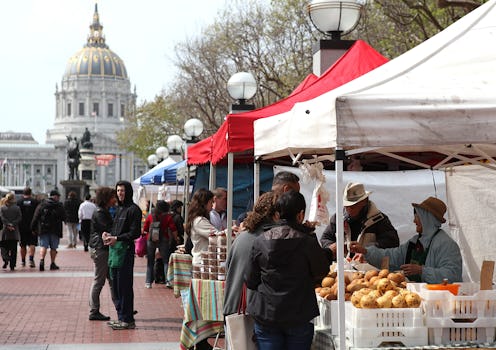Life
Some SNAP Users Won’t Be Able To Use Their Benefits At Farmers Markets After This Month

Folks who rely on the Supplemental Nutrition Assistance Program (SNAP), formerly referred to as food stamps, face a near constant barrage of proposed cuts to the system, from the Trump administration's idea of replacing SNAP with food boxes to the proposed 2019 budget cutting SNAP funding by almost 30 percent over the next decade. But while many of these proposals are still in political limbo and not likely to immediately affect recipients, some SNAP recipients who use their benefits at farmers markets to purchase fresh produce may be on the verge of losing access to those products, The Washington Post reported.
According to Dan Nosowitz writing for Modern Farmer, the loss of access has to do with a "seemingly minor" change in government contract. What happened was that the contract for the Farmers Market Coalition, a nonprofit that coordinates with Novo Dia Group, the company that currently processes about 40 percent of SNAP transactions at U.S. farmers markets to distribute their technology, was up for renewal in November 2017. But rather than renewing, the United States Department of Agriculture (USDA) awarded the $1.3 million contract to Financial Transaction Management, which will have to re-implement the technology to process these transactions.
The Novo Dia Group will therefore be ending its service on July 31, which will leave "about 1,700 of the more than 7,000 markets that offer SNAP [...] with no way to serve low-income customers," The Washington Post reported.
On top of compromising many SNAP recipients' access to farmers market foods, the Novo Dia shutdown "also will compromise a range of incentive programs that have emerged over the past decade to improve low-income shoppers' access to healthful food," The Washington Post reported, adding that these incentive programs often have the purpose of matching SNAP benefits at farmers markets, thus giving recipients more money to spend on fresh food.
Modern Farmer explained that the purchase process for SNAP recipients who want to shop at farmers markets involves "a special bit of hardware and software" required for recipients to be able to swipe their SNAP-given electronic benefit transfer (EBT) cards. Nosowitz took New York City as an example, saying that when SNAP recipients enter a New York City farmers market, they can go to an information tent, swipe their EBT card, and "[i]n exchange, they'll get wooden tokens, which are accepted by almost all vendors at every market," with the exception of alcohol and cut flowers, Nosowitz added.
Where the Novo Dia Group comes in is at that EBT card swipe. The exchange process is powered by software that Nosowitz wrote is produced by several companies, but "the biggest is [...] Novo Dia, which supplies over 1,700 farmers and farmers markets" with its software, Mobile Market Plus. The Washington Post reported that after Novo Dia and similar companies came onto the scene in 2012, "SNAP benefits redeemed at farmers markets increased by 35 percent, to $22.4 million in 2017 from $16.5 million in 2012, meaning more fresh produce for low-income people in both rural areas and cities." Josh Wiles, the president of Novo Dia, told Modern Farmer, "Our assumption was that we would be able to, for lack of a better word, bid on [the government contract], or at least be contacted [about our services]. And we weren't."
Wiles told Modern Farmer that it became clear about a month ago "that [Novo Dia] would not be part of Financial Transaction Management's plan going forward. Without that, Novo Dia's customers would not be able to afford its fees, and Novo Dia would have no way of making money from Mobile Market Plus." Modern Farmer reported that Wiles said Novo Dia "tried for weeks to figure out how to keep providing this service, but with no money coming in, it doesn't seem possible."
No money rolling in is a big hit for Novo Dia because, as The Washington Post reported, companies that handle SNAP transactions require extra ("read: expensive," The Washington Post added) security measures "beyond what is required for credit and debit cards." And, "profits are small because markets and individual farmers process micro-payments, often as little as a few dollars."
According to The Washington Post, Financial Transaction Management is due to begin taking applications for new farmers market transaction processing equipment on July 14, but "it will take several weeks for applications to be approved and the equipment to be distributed." Because of that, some markets may be back to serving SNAP recipients in August, but as The Washingon Post points out, "that is more than halfway through the market season in most areas of the United States."
Angela Sparrow, the CEO of Financial Transaction Management, told The Washington Post in an email, "I am aware of the current deficiencies in the farmers market merchant world and fully intend to work with my partners with a maniacal focus on executing in a manner that will quickly resolve this long overdue problem."
The Washington Post also received a comment from the USDA, with a spokesman saying "the agency has been alerted of Novo Dia's pending shutdown and is 'analyzing the impact this decision will have on our program participants as well as farmers and producers.'"
Affordable access to fresh food is vital for low-income households, especially those who live in food deserts and who face criticism for buying sugary snacks or "unhealthy" foods on benefits. One thing is certain: further restricting SNAP recipients' abilities to access fresh food is not going to benefit anyone.